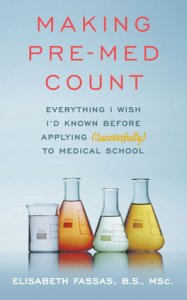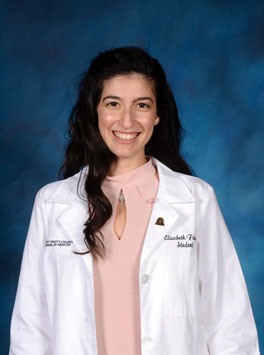
“Overextending yourself is a common mistake…This is a holdover from the college admissions process.” We continue our interview with Elisabeth Fassas, author of Making Pre-Med Count: Everything I wish I’d Known Before Applying (Successfully!) To Med School. Topics discussed: how to balance maturity with humility, biggest surprises about med school, the experiences that best prepared her for med school, and how writing a book fit into her pursuit of becoming a doctor, where the MCAT is going, and if med school admissions is too numbers-focused. Catch up from the first part of our interview here.

When you were applying to med school with your peers, did you notice anyone make fatal mistakes that cost them an acceptance?
A lot of people in my major ended up delaying because their GPAs weren’t where they wanted them to be. Overextending yourself is a common mistake. I talk about this in the book a little bit: that people get so caught up. This is a holdover from the college admissions process; people get so caught up in making sure that they’re involved in a million different things and that they’re checking all these boxes that they end up letting their grades suffer because of that. But you can’t really trade one for the other in the process, because it is so competitive. I have a lot of friends–and not that this is necessarily a bad thing–that ended up pursuing master’s degrees just to get their GPA up, and they’ve all ended up in medical school or where they wanted to be at the end of the day. So it’s not the end of the world; it’s just a little bit more of a time commitment if your GPA’s not ready to go when you’re ready to apply.
You wrote in your book that showing maturity is more important than your titles and responsibilities. How should applicants balance showing maturity while acknowledging they still have a lot to learn about life?
I think that number one is going to be owning up to any mistakes that you make throughout undergrad. We all have them, whether that mistake is poor performance on tests or some kind of administrative issue. There’s a lot of stuff that goes on in four years. Really taking the time to just own up to that and say, “I did this. I got caught cheating” or “I failed this one exam.” Owning up to it in the application process–and there is a place for that. I think shows a lot of personal maturity to say “You know, this is what I was thinking at the time. This is what happened, these are the consequences, and this is what I’ve taken from that. And I am never going to do that again for X and Y reason.” I think that shows a lot of a lot of growth. Specifically for the medical school application process, there’s a lot of space to talk about your extracurriculars and what you got from them. Something that I see a lot in applicants is, “Oh, I can’t do anything because I’m not a doctor,” or “Oh, I did everything right; I’m saving this patient’s life.” You should acknowledge and say, “I’m not a physician. I can’t serve patients at the position right now. But this is what my goal is, and this is what I could do, and I tried to do it as best as I could.” That really acknowledges both how much you are able to do and how much you have left to learn.
How has med school differed from what you thought it’d be?
It’s been definitely challenging. There’s a lot more memorization day-to-day than there was in undergrad, just because there’s so much material to learn. I expected it to be a little bit competitive amongst peers and I wouldn’t say that I found that at all. I think the people that I found here are awesome, are really excited, really invested in all of us doing really well. We share notes, share resources that we found online.
People are always willing to answer questions, which I think is awesome. At this point in the year, I think I’ve gotten the hang of how much I need to study and what successful studying looks like to me and so I’m getting to a point now where it’s not as stressful as it was in August or September to make sure that I’m getting all of my work done. So it does mellow out at some point when you do get to get a hang of everything. It’s a lot, but manageably so.
Which of your life experiences prepared you most for med school? You got your grad degree in London, you worked in the corporate sphere, and you graduated from a competitive undergrad school.
That’s an interesting question. My master’s degree was really interesting. Because I did it in the UK, their system of teaching and testing is just so different. My undergrad was very similar to medical school, where we had three midterms, they called them, per semester per class. We were always on, and I learned really, really well. I had a super strong foundation coming here. I feel really comfortable with all the material that I got. But then going to the UK, they have an opposite system. When I did my master’s degree, we only had one set of exams for all of our classes in May, and that was it. I didn’t have any assignments at all between September and May, so it was much more relaxed. The onus was much more on me to ensure that I was keeping up with my material and then ultimately, I was asked to retain all of the information for nine months in order to be tested in May.
How did that change your perspective?
For me, it was a real change of pace to say, “Okay, I can not study for a whole month and still be okay.” It put into perspective that I had the ability to learn a lot of information, because I procrastinated in my master’s degree. I do have the ability to learn a lot of information, and I learned that material fairly well and I feel very comfortable with that as well. So just to say that there are a lot of different learning styles and it’s okay if one week I’m just not on top of my stuff as much as I need to be and there are other things going on; everything’s going to be okay again. Doing my master’s in the UK has really helped me to temper my stress, whereas if I hadn’t done it, I would be much more anxious on a day-to-day basis about how much I’m getting done and how much I’m managing to learn.
How do you think your McKinsey experience contributes to your everyday life as a med student?
The component of stress is very similar. Taking a look back on it and saying, “You know what, there were days that were really, really hard, and there were days that were fine. And at the end, everything worked out fine: projects completed, clients are happy, everything else okay.” So it’s very similar. I always try to tell myself, even for exams and things, “What’s the worst that could happen here? Nothing; it’s fine.” It really, really helps to temper the stress and has made my experience a lot more pleasant than some of my peers who I think are much more anxious about the day-to-day.
Speaking of stress, what was it like to write a book while attending grad school abroad and preparing for medical school?
I was back and forth traveling, but it was really nice. It was like a nice escape to be able to write. I’ve always really enjoyed writing, and it was great to be able to just sit down and do that. It was relaxing in the sense that I was talking about something that I felt super comfortable talking about, which I think was different from my day-to-day, where I was always learning and always trying to do something different and something new. It was like a reset for me in the way that people do yoga. I would go on Saturdays to a coffee shop or a cafe and just sit and write.
What can you share with aspiring authors about getting published and writing a book?
The key thing is that you really have to be on top of yourself if you want to have something done. The publishing team at Kaplan was incredible because they were very flexible. They knew that I had a lot on my plate and didn’t want to add any more stress to my life, and so they were like, “This is when we would like it by, but if you need more time, let us know.” And I did that once. I was like, “I’m not ready yet,” and I realized how far back this gets pushed is on me. And I would not like to put push it back that far. I don’t want to be still editing or still writing while I’m starting school. So really, recognize and take the onus on yourself. How much you get done and how much you are able to accomplish within any given month or year or whatever is really on you. The older you get, the less you have people reminding you and pushing you to do stuff. Find something that you’re really, really actually interested in getting accomplished, and then push yourself to do that. And if you find that you can’t, then maybe that’s not what you want to be doing.
How long was the process from conception to publication?
I think it was June 2018 that I submitted the proposal. It got published just last week. So one and a half years from conception to publishing.
What’s your relationship like with Kaplan?
I do teach the MCAT for Kaplan. And I do both tutoring, where I go through each individual question on the MCAT, and coaching students, helping with strategy from beginning to end: how you’re shaping your application and how your MCAT process fits into that. That’s where I saw a lot of students telling me things that didn’t make a lot of sense in terms of how they were planning on designing their applications. The other day, I was talking to a student who was planning on taking the MCAT in March and hadn’t taken biochemistry yet. Biochemistry is the most tested material on the exam. So being able to have a conversation like, “Okay, look, let’s think about what that actually looks like for you” was something that I really enjoyed doing, and it inspired me to write this for people who don’t have the traditional resource to have something to turn to.
And did Kaplan approach you with the book idea or did you pitch it to them?
Kaplan launched the publishing firm 750 Publishing. At some point during that process, they sent out a mass email and was like, “Have you ever thought about writing a book? Send us a sample chapter.” That’s how it started.
